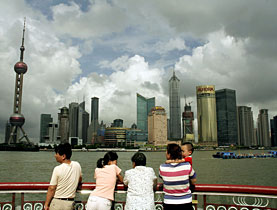Two-way trade blossoms with China

Economic relations between Switzerland and China are booming, with trade growing at an annual rate of 20-30 per cent.
Whereas in the past investment was all one way, in recent years Chinese companies have begun to establish a foothold in Switzerland.
“Switzerland’s major companies were into globalisation long before those of other countries, because the Swiss domestic market is very limited and we lack raw materials,” explains Massimo Baggi, responsible for economic relations with Asia at the State Secretariat for Economic Affairs (Seco).
“They have therefore been obliged to look for outlets abroad and concentrate on specialised products, which are obviously also of interest to the Chinese.”
As a result, Swiss companies were among the first to establish relations with China once Beijing began to go down the road of economic liberalisation. In 1980 the Swiss lift manufacturer Schindler set up the first joint venture between a Chinese enterprise and a Western company.
Today, Swiss businesses enjoy something of a privileged position in China.
Switzerland is in fact one of the very few industrialised countries whose trade balance with China is not in the red. Growing at an annual rate of 20-30 per cent, Swiss exports were worth SFr5.4 billion ($5.36 billion) in 2007. China is now Switzerland’s most important commercial partner in Asia, ahead even of Japan.
Challenges remain
To achieve this, Swiss companies have nevertheless had to invest heavily in what is still a difficult market, despite the ongoing process of liberalisation.
“There are classic barriers to access, such as prohibitive customs duties in some sectors, technical obstacles to trade and a business culture very different from our own”, Baggi said.
“Then there is the problem of infringement of intellectual property rights, particularly acute for Swiss businesses since most of the products they export are of high added value. Emerging countries such as China do have laws compatible with our standards, but there is still a deficit where supervision, policing and training are concerned.”
To alleviate these problems and improve access to the Chinese market, the Swiss government intends to conclude a free trade agreement with the Beijing authorities in the near future, despite hesitations on the Chinese side.
Though China’s economic growth has slowed slightly, relations with the Asian giant are an increasingly important factor in Switzerland’s foreign trade policy.
“It is extremely important that Switzerland strengthen its economic ties with China, because this would enable us to reduce our dependence on the European and North-American markets,” Baggi said.
“In terms of foreign trade, it is worth emphasising that Asia is already Switzerland’s second-largest market, behind Europe but ahead of North America. This represents a fundamental change of paradigm. And I believe the trend is set to continue.”
European platform
Until recently it was Swiss companies that were investing in China, but now we are seeing two-way traffic.
The economic boom has enabled China to build up enormous reserves of capital. As a result, Chinese businesses and individuals are seeking new markets in which to invest their money.
“Compared with Switzerland’s economic presence in China, this is still a fairly small-scale phenomenon. But the process is accelerating,” said Marco Rhyner of the Swiss Foreign Investment Agency China (Osec), the organisation tasked with promoting inward investment from China.
“In the past 20 years the Swiss and other European economies have lost many jobs as manufacturing has moved to China. Now Chinese companies are beginning to set up subsidiaries and create employment over here.”
Following in the footsteps of individuals and families – who have opened restaurants, shops and medical practices – 30 or so Chinese companies have also become established in Switzerland in recent years, especially commercial enterprises that use Switzerland as a platform for accessing the European market.
They are bringing in bicycles, motorcycles, telephones and some high-technology components, as well as textiles, shoes and other typically Chinese products.
Other Chinese enterprises have begun producing or assembling domestic appliances, televisions, radios, telephones and computers.
“There are even Chinese watch-makers who would like to set up in Switzerland and are looking for a ‘cluster’ that would provide them with the knowledge and experience they lack in this sector”, Rhyner says.
swissinfo, Armando Mombelli
Since 2002 China (with Hong Kong) has been Switzerland’s principal commercial partner in Asia, ahead of Japan.
The value of Swiss exports to China (machinery, watches, chemicals and pharmaceuticals) increased from SFr415 million in 1990 to SFr5.4 billion in 2004.
Over the same period, imports of manufactured goods from China (machinery, textiles, chemicals and watches) increased from SFr418 million to SFr4.8 billion.
Direct investment in China by Swiss firms amounted to almost SFr1 billion in 2006. More than 300 Swiss companies are operating in China, employing roughly 60,000 people.
Thirty or so Chinese companies are active in Switzerland.
1918: first treaty of friendship.
1950: Switzerland is one of the first countries to recognise the People’s Republic of China.
1974: first commercial agreement.
1980: joint venture between the Swiss lift manufacturer Schindler and a Chinese firm.
1986: agreement affording mutual protection for investments.
1989: scientific and technical cooperation agreement.
1992: patent protection agreement.
1996: first visit to China by a president of the Swiss Confederation (Jean-Pascal Delamuraz).
2002: Opening of the Swiss Business Hub in Shanghai
2004: protocol of understanding on tourism.
2007: joint declaration on the protection of intellectual property.

In compliance with the JTI standards
More: SWI swissinfo.ch certified by the Journalism Trust Initiative












You can find an overview of ongoing debates with our journalists here . Please join us!
If you want to start a conversation about a topic raised in this article or want to report factual errors, email us at english@swissinfo.ch.